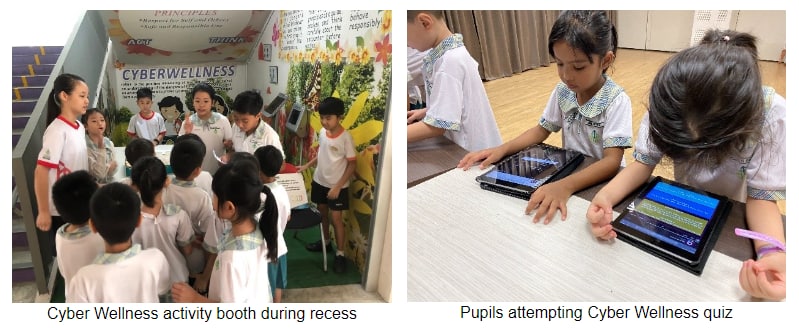Digital Literacy
Digital Literacy
Curricular Objectives
Every Westwood pupil will become:
- Self-directed learners in technology
- Active Contributors to the digital world
- Confident persons in navigating cyberspace safely
- Concerned citizens in cyber wellness and digital empathy
Digital Literacy Programme
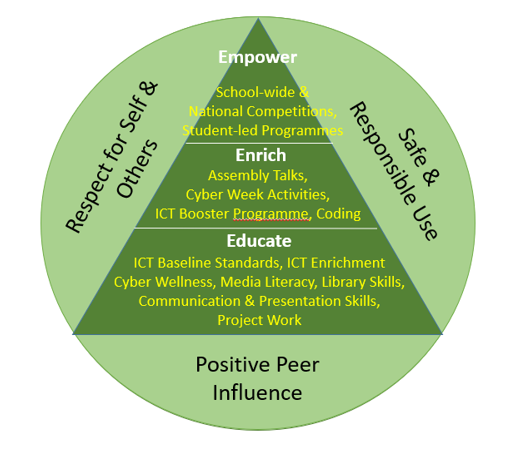
In Westwood Primary, the Digital Literacy programme comprises of ICT Baseline Standards, ICT Enrichment, Cyber Wellness and Media Literacy. Our ICT Baseline Standards is integrated with Project Work under our Applied Learning Programme (ALP), which is aligned to the school’s Thrive Framework to develop future-ready and responsible digital learners.
Overview of ICT Baseline Literacy Programme
Our Baseline ICT Standard Literacy Programme and Project Work aim to equip every Westwood pupil with the essential ICT skills for the 21st Century, to become self-directed and collaborative learners. We will be showcasing our pupils’ work by levels via this Google Site. You are strongly encouraged to take a look at your child’s/ward’s work and write some “Words of Encouragement” for him/her using the Padlet links. We hope this will help parents better understand their child/ward’s learning in school. Partner us in nurturing our pupils to be future-ready and anchor-steady.
ICT & Coding Baseline Literacy Programme
| Level | Timeline | ICT Enrichment | ICT Baseline | View Students’ Workpieces |
|---|---|---|---|---|
| Primary 1 | Term 1 | Scratch Junior | Touch-typing and MS Word | Click Here |
| Primary 2 | Term 1 | Scratch 3.0 Beginner | MS Powerpoint | Click Here |
| Primary 3 | Term 4 | Scratch 3.0 SLS HBL | Google Slides and Sites | Click Here |
| Primary 4 | Term 4 | Sphero Block Programming (IMDA) | AI for Fun (IMDA) | Click Here |
| Primary 5 | Term 2 | Microbit Block Programming | Microbit Block Programming | Click Here |
| Primary 6 | Term 4 | Video Maker | Video Maker | Click Here |
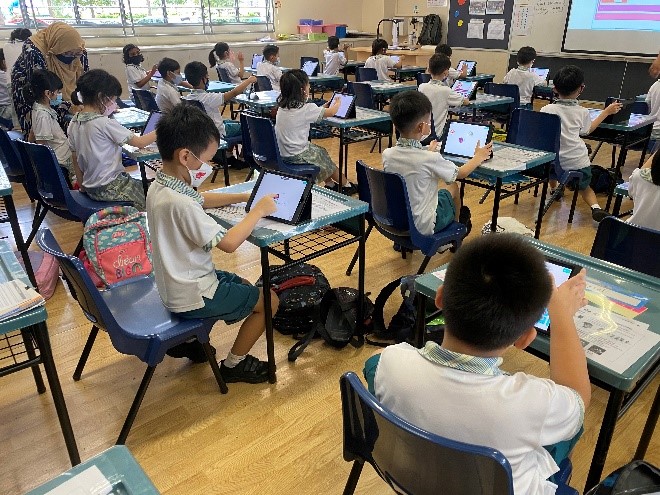
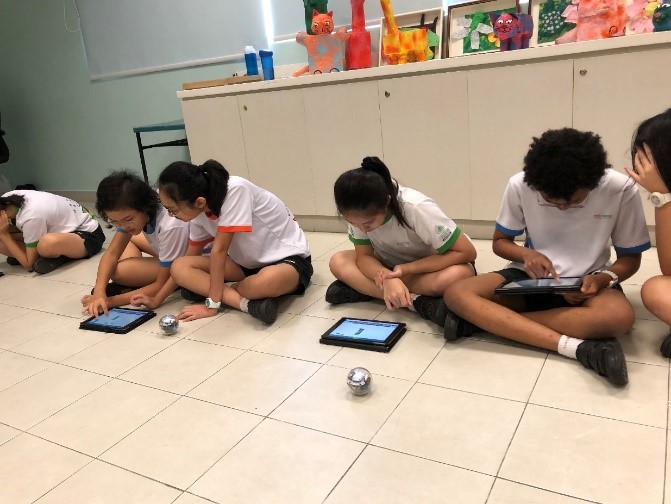
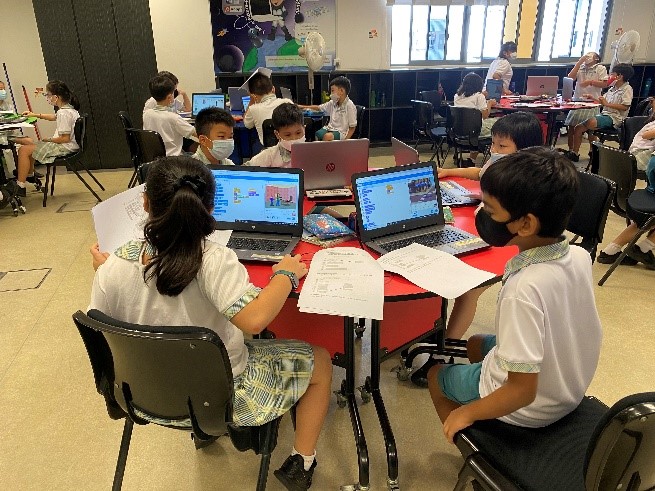
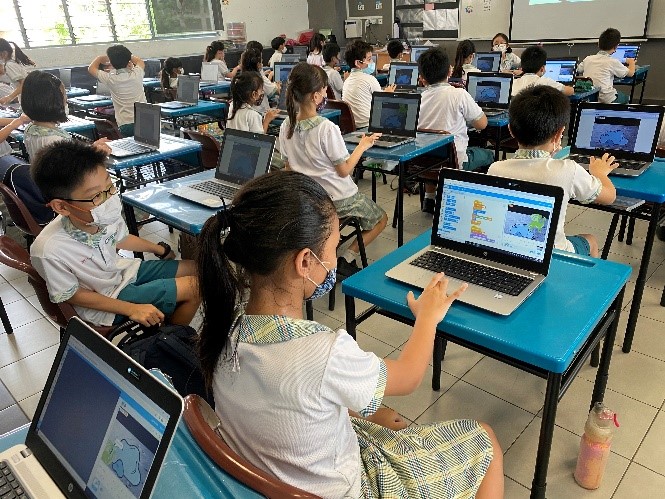
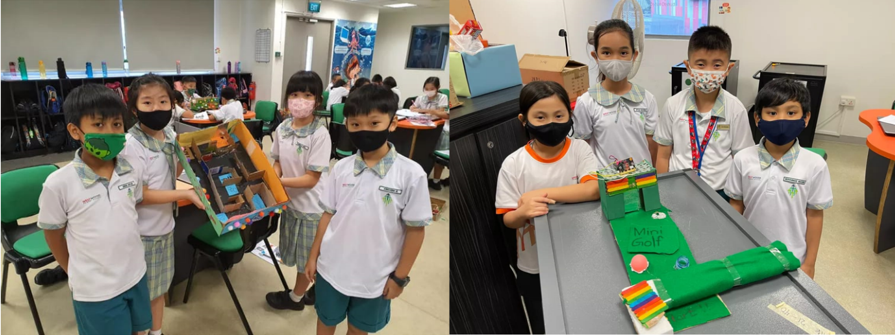
MOE’s Cyber Wellness Framework
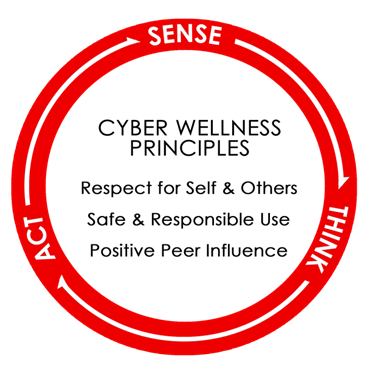
The framework focuses on developing the child’s instinct to protect and empower him to take responsibility for his own well-being in cyberspace. It highlights three principles, ‘Respect for Self and Others’, ‘Safe and Responsible Use’ and ‘Positive Peer Influence’, in guiding students to make careful and well-considered decisions in the cyber space.
Principles
(1) Respect for Self and Others
Students need to:
- uphold their own dignity when online
- respect other people online
(2) Safe and Responsible Use
Students need to:
- understand the risks of harmful and illegal online behaviours, and take steps to protect themselves
- make wise and healthy choices online
(3) Positive Peer Influence
Students need to:
- be a positive role model online
- advocate positive online behavior
3-Step Process
The process of Sense, Think and Act serves to highlight the stages that a student should undergo to prepare himself/herself to self-manage in cyberspace. The process could serve as a heuristic device to help teachers organize lessons on cyber wellness topics.
Sense - The first step in inculcating these principles is to create cyber awareness among the students. Students should be able to “sense” the risks of harmful behaviours online and learn how to manage such risks as well as protect themselves from the dangers.
Think - To develop students’ ability to respond to new encounters in cyberspace, it is important to provide opportunities for students to analyze, evaluate and reflect on cyber wellness issues.
Act - Students should eventually translate their understanding into actions that will keep them safe while online.
Students should always “be aware”, “think” before “acting” while they are online. Therefore, “Sense, Think and Act” is a simple learning cycle for students to adopt. We will also reinforce this process when delivering their cyber wellness programme.
Overview of Cyber Wellness & Media Literacy Programme
Cyber Wellness (CW) refers to the positive well-being of Internet users. It involves an understanding of online behavior and awareness of how to protect oneself in cyberspace. The focus of CW is about helping students to become responsible digital learners. Students should also be a positive peer influence by harnessing technology for collaboration, learning and productivity, as well as advocating positive use of technology for the good of the community. Our Cyber Wellness Programme aims at covering a holistic range of safety issues brought about by the increased use of technology in our student’s lives. Guided by MOE’s Cyber Wellness Framework and Digital Literacy & Technology Skills Guide, the programme extends its reach further by identifying new threats that students may face and addressing them through level targeted Digital Literacy projects.
